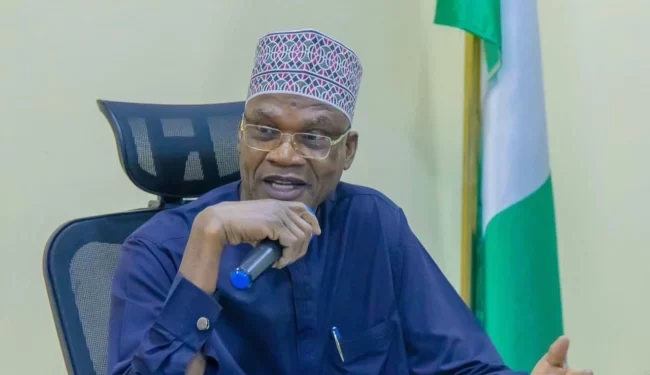
THE Minister of Education, Professor Tahir Mamman says that he and the Minister of State for Education, Dr Yusuf Sununu are on track to revamp the sector and place it on a sound footing.
Mamman has been in the eye of a storm over his directive to the National Examinations Council (NECO) and West African Examinations Council (WAEC) to stop registration of individuals under the age of 18 years for their examinations.

While giving account of his stewardship at news conference, he said so much had been achieved in the last one year of assumption of office as a Minister of Education.
He reaffirmed the commitment of the Federal Government towards addressing the energy crisis being faced by universities and other tertiary institutions in the country.
According to him, one of the biggest challenges confronting universities and other tertiary institutions is power, disclosing that the Federal Government has in response to the challenge, approved the connection of universities and other tertiary institutions to the Compressed Natural Gas (CNG).
He noted that though this appear to be a long term solution to the epileptic power supply in the tertiary institutions, discussions were on how to achieve discounted rates for the institutions following the recent tariff increase by electricity regulatory agency.
Mamman admitted that the high cost of electricity tariff is unbearable to many of the institutions as some of them had their electricity bills increased from N80 million to about N300 million.
The Minister said: “One of the biggest challenges facing tertiary institutions is the issue of power. The heads of the institutions are lamenting heavily about the high electricity bill they pay monthly.
“Last week, the vice chancellor of University of Lagos (UNILAG) came with a complaint of huge electricity bill for the last month, which was over N470 million. Similar complaints have been received from different other institutions.”
He said the Ministry is deeply concerned about the huge electricity bill, hence it sought solutions, and that the Federal Executive Council (FEC), and the President approved that the universities be connected to the CNG as alternative to the public power supply.
He explained that their vehicles, campuses and other facilities would be converted to CNG. “This will, expectedly, help to reduce the huge electricity bill being given to the schools.”
The Minister revealed that the ministry under his watch developed a roadmap for the Nigerian Education Sector (2024-2027), to provide accelerated development of the sector, saying the document contains 13 thematic areas (pillars) which have been aligned with the 23 ministerial deliverables assigned to the sector by President Bola Ahmed Tinubu.
He said the two documents have been harmonised in a policy statement known as DOTS, which stands for: Data Repository, Out-of-School Children Education, Teacher Training & Development, and Skills Acquisition.
He disclosed that through concerted efforts the Federal Government was able to return four million out-of-school-children to classrooms in basic schools and Arabic literacy programme including 200,500 students with disabilities in one year.
He also projected to take three to four million out-of-school children annually from the street to the class in the next three years.
“Over Four million (4,028,000) young children have been brought to basic school and Arabic literacy programme including 200,500 learners with disabilities through five agencies of the federal ministry of education.
“In the last two weeks, over 20,000 out-of-school children have been registered in Abuja and similar exercise is ongoing across the country. Those who are above school age will be taught skills so that they can continue with their life.
“We are targeting three to four million out-of-school children to be brought back to the class every year for the next three years,” he said.
He said the ministry had also increased school enrolment of learners from 30 million to 55 million within the one year in focus.
According to him, more than 85,662 teaching and non-teaching staff at all levels in various academic and non-academic institutions have been trained in the last year.
He also said over 40,000 facilities have been provided by the Universal Basic Education Commission (UBEC) for basic and senior secondary education as there can be no good learning without a good environment.
In the Tertiary education sector, the Minister said over 6,500 facilities have been provided including a laboratory, faculty building to auditorium among others, through Tertiary Education Trust Fund (TETFund) especially.
The minister said over 759,000 scholarships has been awarded to students last year.
“Some of these scholarships are internal while some are external and have taken the burden off the beneficiaries and their parents. Similarly, under the student loan scheme, NELFUND has disbursed N3 billion,” he said.
He said the ministry has processed the payments of allowances to Nigerian Scholars under the Bilateral Education Agreement (BEA), with some foreign countries, urging beneficiaries and parents to exercise restraint as the CBN and the Ministry of Finance are on the verge of paying the money.
He added that the ministry under his watch implemented the Transnational Education (TNE) system that gives opportunities to Nigerian scholars to get world-class education with less finances, as doors have been opened for foreign countries to come and invest in Nigeria.
The ministry has also employed the use of Artificial Intelligence (AI) and other forms of technology for teaching, just as emphasis has been placed on technical education from the primary to tertiary education level to enhance hands-on skills for the labour market after graduation.
“Before now, many had no skills resulting in unemployment but now technical colleges, polytechnic, colleges of education (technical) are being strengthened.
“From September/October this year, schools will begin to teach skills from primary schools so that when students graduate at any level of education, they will be ready for the labour market,” he said.
He said the ministry under him, re-invented and enhanced the Safe School standards, especially the establishment of a rapid response team for security, provision of CCTV for security in schools, building of fences in schools, and sensitising communities on security measures.
Others he said include the review of the school curriculum including that of crafts and artisans, early grade learners as well as streamlining of policies on distance learning.
Read Also: Fuel price hike: Nigerians groan, lament govt’s insensitivity







